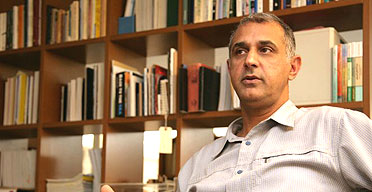Senan Abdelqader - a Palestinian architect
 Wednesday, October 22, 2008 at 04:40PM
Wednesday, October 22, 2008 at 04:40PM 44, an architect in Beit Safafa, just south of Jerusalem
- Rory McCarthy
- Tuesday June 5 2007

Senan Abdelqader, an Israeli Arab architect at his office in Jerusalem. Photograph: Gali Tibbon
Abdelqader is from the 20% minority of Arabs living within Israel, a people most often referred to by the Israeli establishment as Arab Israelis. It is not a term he uses. "I am sure about my identity. I am an Arab Palestinian ... I don't feel myself very Israeli," he says. He carries an Israeli passport, but that isolates him from most of the Arab world - he can only travel to Jordan and Egypt. "But even when I go there I am considered an Israeli and I am not part of Arabic culture. And this is painful. I cannot feel myself."
In Israel he is part of a minority that, though it has citizenship, suffers routine and continued discrimination, particularly at work and in government spending on housing and education. Although Palestinian Israelis can travel freely within Israel, they, like all Israeli citizens, are not allowed to travel to the main urban centres of the West Bank. Often they are also restricted from travelling to Gaza. There are Palestinian Israeli MPs in the Knesset, and earlier this year the first Muslim Arab cabinet member was appointed. However, several Palestinian Israeli intellectuals and activists have begun a campaign to demand broader rights in Israel, and have started to challenge the notion of Israel as a Jewish state.
The fraught question of identity shapes Abdelqader's work. No new Arab town has been built in Israel since the state was created. "Since 1948, the urban fabric in Palestine has been stopped. But it is more than stopped, it has been forced to take a kind of agricultural mentality." Arab towns in Israel are more like enlarged and overcrowded villages.
Abdelqader, who is now perhaps the leading Palestinian Israeli architect in Israel, is working on a project to design a contemporary art museum for Umm al-Fahm, an Arab town in northern Israel. His design puts the museum inside a wide bridge that stretches across a valley, a bridge that will be part public, cultural space, part busy walkway. It is unusual for a Palestinian Israeli architect to have such input in a public project. "We are not part of the process of influencing and creating public spaces."
Although he has worked on several other buildings in Israel, there has been little opportunity to work alongside architects living in the occupied Palestinian territories, even though they live nearby, speak the same language and share the same history. Many Palestinians sense a broad divide between those living within Israel and those living in the West Bank or Gaza, both in terms of opportunity and ambition. While Palestinians in the occupied territories are still struggling to end 40 years of occupation and establish their own state, within Israel some leading Palestinian figures have become increasingly vocal in demanding broader, collective rights and in challenging the rationale of a Jewish state.
Two agendas
"The Palestinian nation became divided into two different agendas and it makes me very sorry not having the opportunity to work together with them," he says. "There are two different agendas: we are looking for equality, they are looking for authority."
He teaches architecture at Tel Aviv University, where the vast majority of his students are Jewish Israelis. That itself is often an initial challenge for the students in a country where the two communities often do not mix, or see each other only through the tint of mutual suspicion and unequal power relations, where Arabs are more often seen working in menial jobs, standing at the petrol pump or cleaning the streets.
"Jewish Israeli society has to understand that we were here and part of the landscape before they came and they will understand that they have to have more respect for us."
==================================================================
 APJP | Comments Off |
APJP | Comments Off |